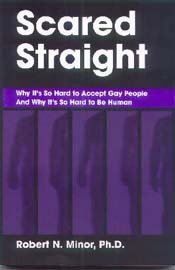 |
|
Scared Straight: Why It's So Hard to Accept Gay People and Why It's So Hard to be Human, by Robert N. Minor, Ph.D., HumanityWorks, 2001, 216 pages, paperback, $14.95
In a manner calculated to reach general audiences, the author, Professor of Religious Studies at the University of Kansas, takes his readers on an extraordinary journey, right to the core of their most pertinent personal problems . Like a clairvoyant, he peers into the fog surrounding our culturally-induced consciousness, thought patterns that are currently failing us, noting how they work to thwart our general welfare. But next, he effectively celebrates a futuristic awareness that I, for one, regard as central to our personal growth and satisfaction. Scared Straight, in other words, invites you to get to the root of bothersome things that stand in the way of a happier life for all. It tells you what fears you or your friends are most likely to entertain and how to dissipate them henceforth. This is no everyday pop psychology book. It is a clean, hard look into what motivates us most. It serves as a powerful guidepost, throwing queries like daggers at those illusions we seem to have accepted without question. It places us, with great ease, into a new and rewarding dimension. The sub-title hints that that there is a connection between not being able to accept gay people and not being able to be fully human. It all has to do with socially-induced fears. Dr. Minor uses the word "straight" in much the same way that the divine 1960s Counterculture did. I fondly recall that to the much-inspired bisexual hippies of those halcyon days, straight no longer meant heterosexual. Instead, it meant conventional, culturally-tied and bound, unquestioningly obedient, and unduly proper. In other words, being utterly boring, saddled with little more motivation than to keep up with the Jones'. But, as Dr. Minor well knows, keeping up with the Jones' can involve many different types of dreary competition. For many men, however, even the accumulation of money, a symbol of manly ability, is not the foremost wealth. Even when stripped of all of their worldly possessions, these men still cling to an often pugnacious posture, signaling that they're tough guys, and, therefore, somehow worthy. They do this, mostly, unconsciously, continuing to ape the warrior role that came into being with the onset of the agricultural revolution when protecting their lands became necessary following the passing of the more individualistic hunting and gathering era. To some, the masculine warrior's image is all they've ever sought to emulate. They were taught to do so early on. Daddy showed them when they were barely two years old how to "put up your dukes."
Minor writes: "When we look at the 'straight' role the system wants all people to live, we are not looking at heterosexuality as a sexual orientation. It is important to distinguish the role from the orientation. Each is distinctly different. If a person identifies as heterosexual by orientation, that by itself does not imply a certain role. However, the system has a conditioned role that is called 'straight' or 'heterosexual acting,' and the system's goal is to condition every human being to live and value that role. Even people who identify as non-heterosexual by orientation, are taught to value and conform to the 'straight' role." This is a book that will make nervous all of those personals ad-placers seeking partners who are "straight-acting." They won't like what this book implies, or what it reveals about their personal mindsets. If this book's viewpoints become sufficiently widespread, we may, some day, see far fewer of such ads in the gay press. |


 This is a book I wish I'd written.
This is a book I wish I'd written.